Learn how to make Korean curry rice at home! Packed with savory, slightly sweet and slightly spicy flavors, this comforting dish is perfect for easy weeknight dinners.
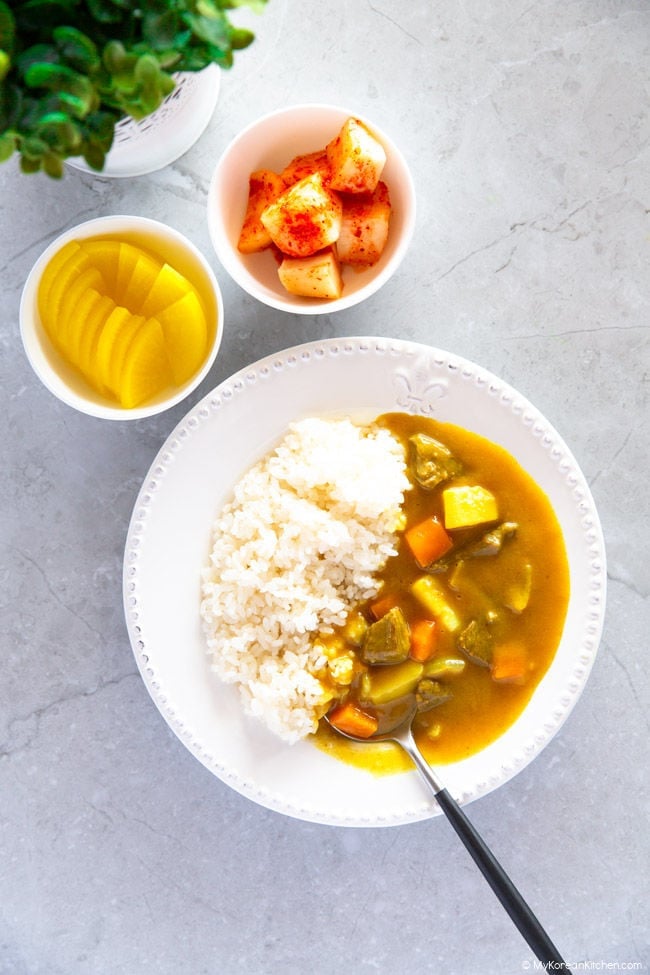
What is Korean Curry Rice
Korean curry rice is a simple, versatile and satisfying dish, making it a staple in many Korean families, especially those with children. Growing up in Korea, I would eat it at least once a week, either at home or in the school cafeteria. It is pronounced “Kare Raisu / Raiseu (카레 라이스)” in Korean, echoing the sound of “Japanese curry rice”. In fact, this dish was introduced from Japan.
The flavor profile of Korean curry is unique, with a slightly sweet, slightly spicy and savory taste. It is similar to Japanese curry but distinct from Indian or Thai curry. Whether you prefer a vegetable-heavy curry or a meat-heavy one, this dish can easily suit your preferences.
How I make my curry
To make Korean curry rice, you start with your choice of small, diced cuts of meat, whether pork, beef, or chicken, and cook them on the stove until lightly browned. Then combine them with a variety of fresh vegetables like potatoes, onions and carrots. This hearty mix is then simmered in water until tender, then combined with a rich, aromatic Korean curry sauce, creating a flavorful, comforting, and satisfying dish.
I would like to point out that pork is typically used in Korean curry, but beef or chicken are also popular.
In fact, I prefer to use stew-friendly diced beef in my curry rice. I find beef has less of a gamey smell than pork, and stew-friendly cuts are ideal for simmering to allow the meat to release all its robust, flavorful goodness into the curry sauce. If you use lean meat, it’s important not to overcook it as it could dry out.
For my family I also like to add a little butter to slightly enhance the flavors and reduce the spice level, even though the curry itself isn’t particularly spicy. This addition not only gives it a delicious buttery taste, but also offers a unique twist. It’s worth noting that this is not a common practice among Koreans, who typically enjoy curry as is.
Once everything is cooked to perfection, the curry is poured onto a bed of fluffy steamed rice. Each bite is a delicious blend of flavours: the sweet nuances of the onions and carrots, the savory depth of the meat, all perfectly balanced by the delicately spiced, umami-rich curry.
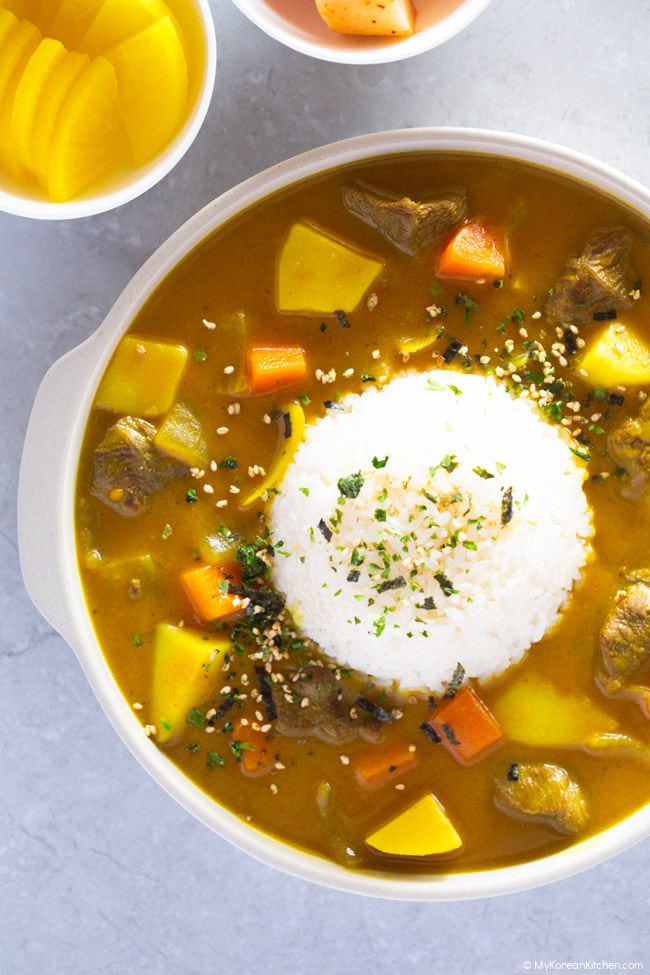

Instant Korean Curry
Now let’s talk about the main ingredient of Korean curry rice: instant curry mix. Many Koreans use this mix because it offers a convenient way to get a rich, complex curry flavor without having to spend hours in the kitchen preparing it. In fact, I have yet to meet any Korean who would mix their own Korean curry powder from scratch at home. The mix is also affordable, which gives you even more reasons to try it!
There are several brands of instant Korean curry available at Korean grocery stores, both in powder form and ready-made roux form. Each brand offers different spice levels, making it easy to find one that suits your taste buds.
So whether you’re looking for a quick dinner fix on a busy weeknight or planning a casual meal with your family, Korean Curry Rice won’t disappoint!
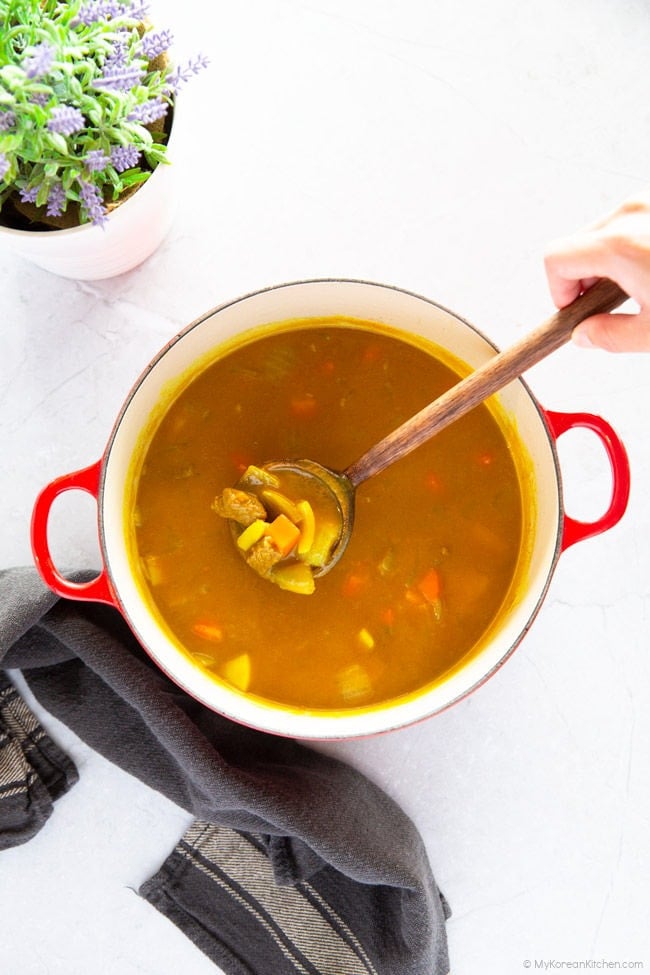

Ingredients for Korean Curry Rice
- 250g beef steak (or meat of your choice), diced
- 1 tablespoon sweet rice wine (mirin)
- 3/4 cup water, to mix with curry powder
- 100 g / 3.5 oz Korean curry powder
- 2 tablespoons cooking oil
- 200g/7oz onion, peeled and cut into large cubes
- 70 g / 2.5 oz salted butter
- 150g potatoes, peeled and cut into large cubes
- 120 g / 4.2 oz carrots, peeled and cut into large cubes
- 4 cups of water
- Steamed rice, to serve
* 1 tablespoon = 15ml, 1 cup = 250ml
How to make Korean curry
1. In a bowl, marinate the meat with the sweet rice wine (mirin), then set aside for 5 minutes.
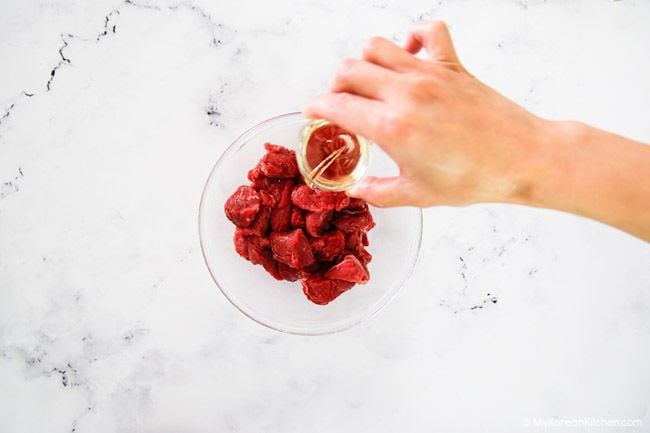

2. In a small pitcher, combine 3/4 cup water with the Korean curry powder. Mix well until the mixture is smooth and well blended.
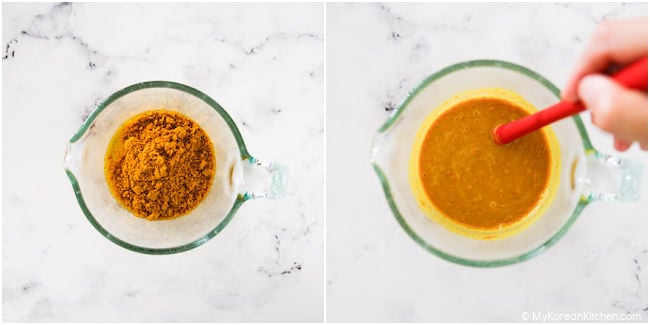

3. Preheat a large pot (such as a Dutch oven) over medium-high heat. Then add cooking oil and sauté the onions until golden brown.
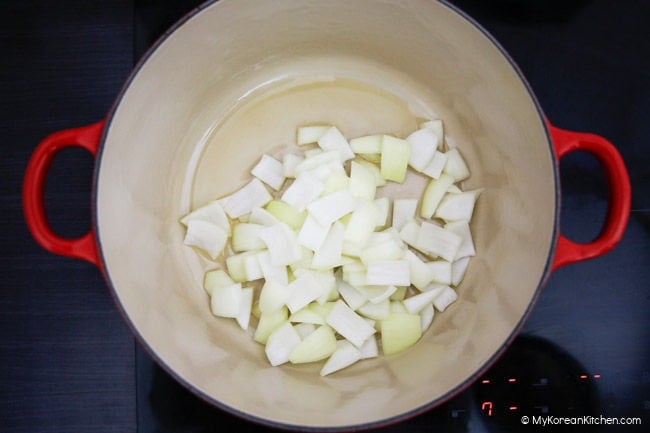

4. Add the previously marinated meat to the pot and mix. Cook the meat until it reaches medium doneness, with a light hint of pink in the center.
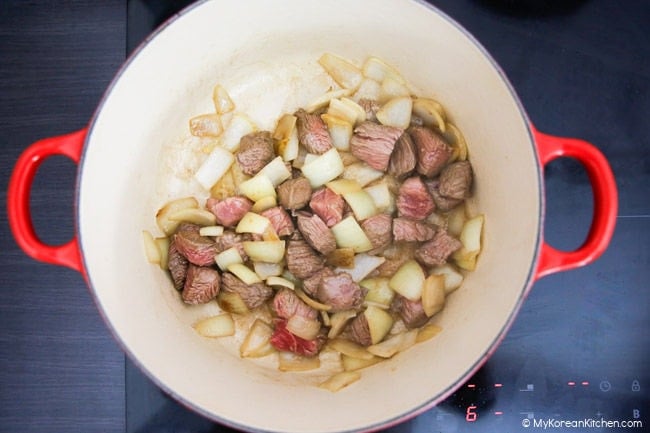

5. Add the butter to the pot and stir until it melts completely and is evenly incorporated into the dish.
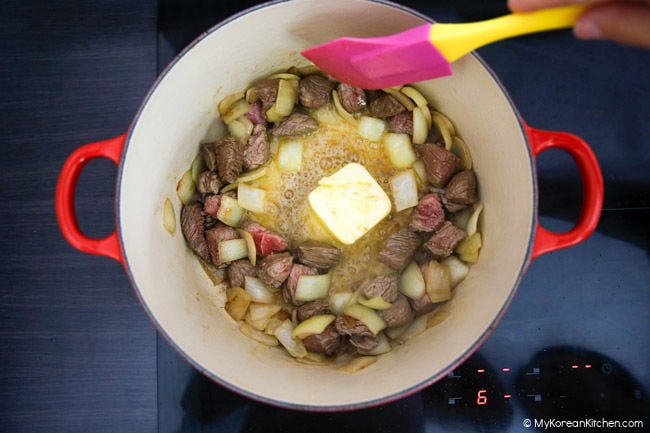

6. Add the potato and carrot pieces to the pot, then pour in 4 cups of water.
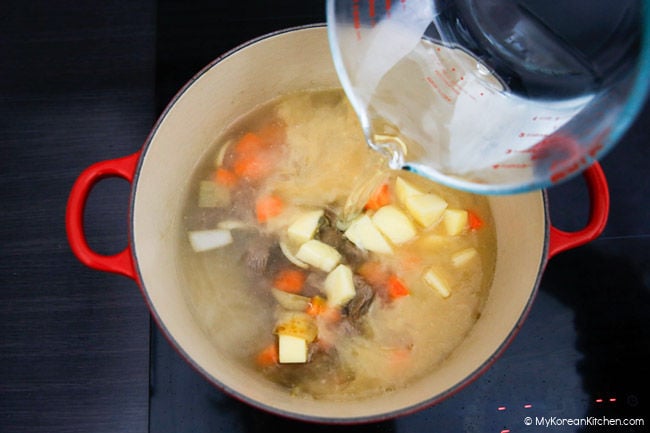

7. Bring the pot to a boil over medium-high heat. Continue cooking without a lid for about 30 minutes, periodically skimming any bubbles or foam that may form on the surface and eliminating them. Stir occasionally to prevent sticking.
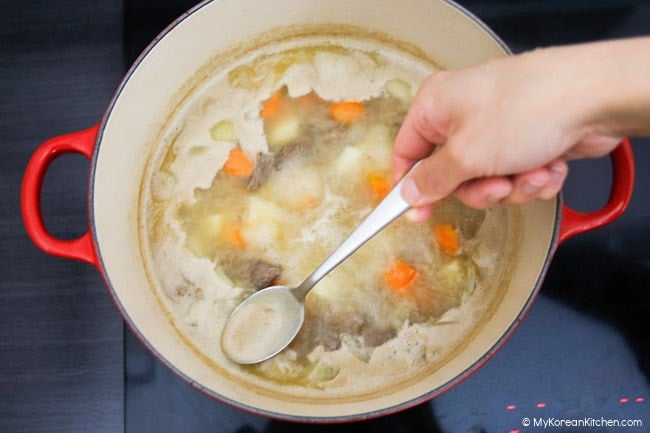

8. Finally, add the prepared curry powder mixture to the pot and stir until the curry thickens, which should take about 1 minute.
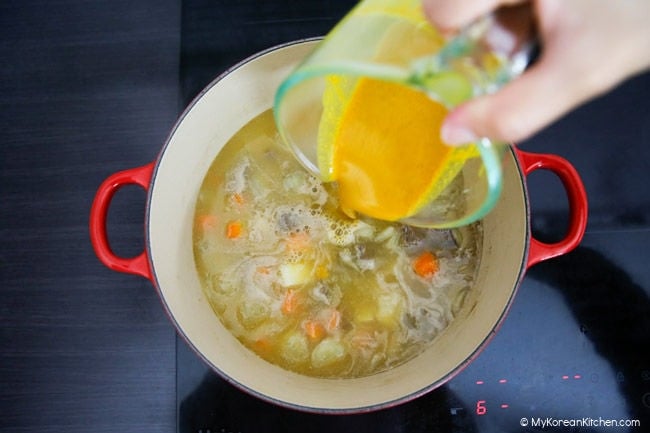

9. Serve the curry on a bed of steamed rice with a variety of garnishes to complement the flavours. Some popular side dishes include kimchi, radish kimchi, pickled radish, and a refreshing pickled cucumber. You can store leftover curry in an airtight container in the refrigerator for 3 to 4 days, or freeze it for up to 3 months.
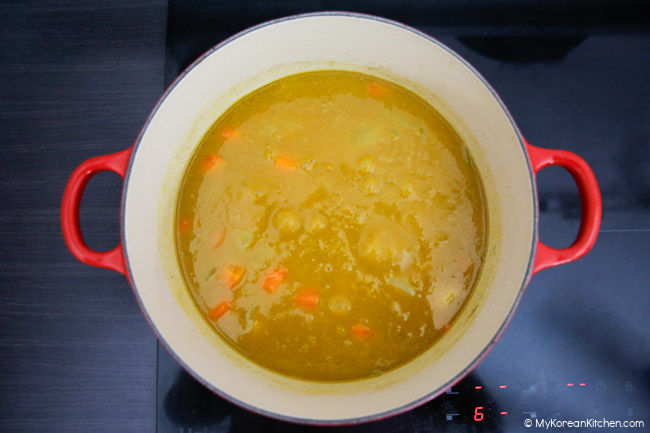

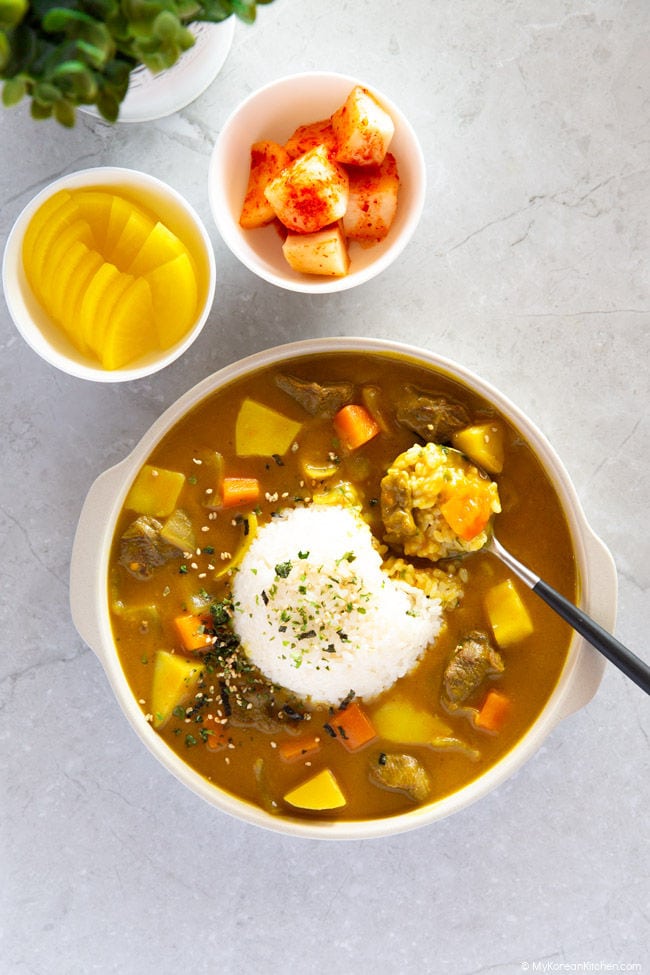

Do you like Korean food? Browse even more delicious ideas from my collection of easy Korean recipes. Don’t forget to sign up for my newsletter to stay updated on new recipes, what the MKK community is cooking, and K-Dramas!
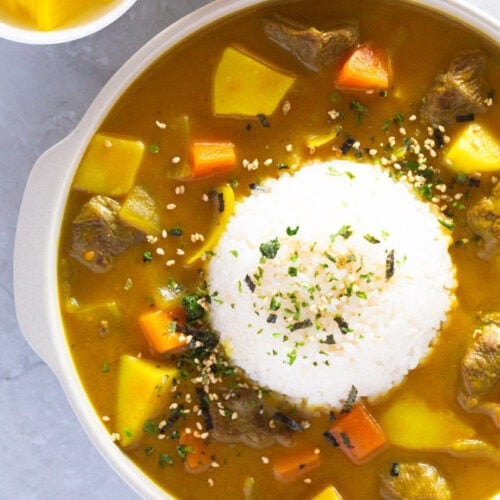

-
In a bowl, marinate the meat with the sweet rice wine (mirin), then set aside for 5 minutes.
-
In a small pitcher, combine 3/4 cup water with the Korean curry powder. Mix well until the mixture is smooth and well blended.
-
Preheat a large pot (such as a Dutch oven) over medium-high heat. Then add cooking oil and sauté the onions until golden brown.
-
Add the previously marinated meat to the pan and mix. Cook the meat until it reaches medium doneness, with a light hint of pink in the center.
-
Add the butter to the pot and stir until it melts completely and is evenly incorporated into the dish.
-
Add the potato and carrot pieces to the pot, then pour in 4 cups of water.
-
Bring the pot to a boil over medium-high heat. Continue cooking without a lid for about 30 minutes, periodically skimming any bubbles or foam that may form on the surface and eliminating them. Stir occasionally to prevent sticking.
-
Finally, add the prepared curry powder mixture to the pot and stir until the curry thickens, which should take about 1 minute.
-
Serve the curry on a bed of steamed rice with a variety of garnishes to complement the flavors. Some popular side dishes include kimchi, radish kimchi, pickled radish, and a refreshing pickled cucumber. You can store leftover curry in an airtight container in the refrigerator for 3 to 4 days, or freeze it for up to 3 months.
- 1 tablespoon = 15ml, 1 cup = 250ml
Calories: 279kcal | Carbohydrates: 15G | Protein: 11G | Fat: 21G | Saturated fats: 9G | Polyunsaturated fats: 3G | Monounsaturated fat: 9G | Trans fats: 1G | Cholesterol: 54mg | Sodium: 142mg | Potassium: 512mg | Fiber: 7G | Sugar: 3G | Vitamin A: 3803UI | C vitamin: 6mg | Soccer: 110mg | Iron: 6mg
The nutritional information shown is an estimate provided by an online nutrition calculator. It should not be considered a substitute for the advice of a professional nutritionist.


